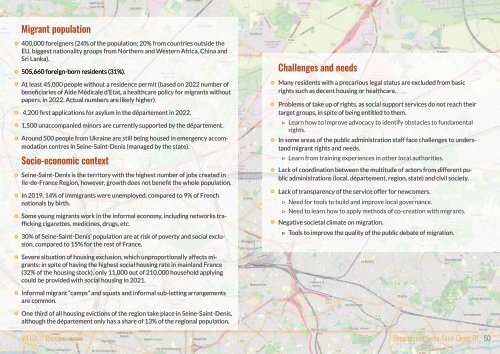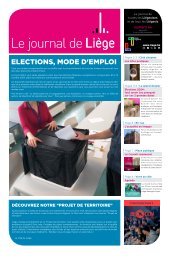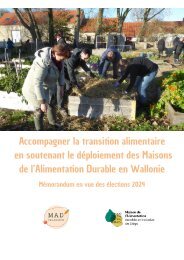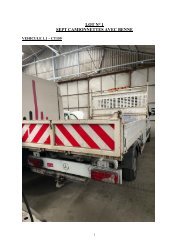Create successful ePaper yourself
Turn your PDF publications into a flip-book with our unique Google optimized e-Paper software.
Migrant population<br />
400,000 foreigners (24% of the population; 20% from countries outside the<br />
EU, biggest nationality groups from Northern and Western Africa, China and<br />
Sri Lanka).<br />
505,660 foreign-born residents (31%).<br />
At least 45,000 people without a residence permit (based on 2022 number of<br />
beneficiaries of Aide Médicale d’Etat, a healthcare policy for migrants without<br />
papers, in 2022. Actual numbers are likely higher).<br />
4,200 first applications for asylum in the département in 2022.<br />
1,500 unaccompanied minors are currently supported by the département.<br />
Around 500 people from Ukraine are still being housed in emergency accommodation<br />
centres in Seine-Saint-Denis (managed by the state).<br />
Socio-economic context<br />
Seine-Saint-Denis is the territory with the highest number of jobs created in<br />
Ile-de-France Region, however, growth does not benefit the whole population.<br />
In 2019, 14% of immigrants were unemployed, compared to 9% of French<br />
nationals by birth.<br />
Some young migrants work in the informal economy, including networks trafficking<br />
cigarettes, medicines, drugs, etc.<br />
30% of Seine-Saint-Denis’ population are at risk of poverty and social exclusion,<br />
compared to 15% for the rest of France.<br />
Challenges and needs<br />
Many residents with a precarious legal status are excluded from basic<br />
rights such as decent housing or healthcare.<br />
Problems of take up of rights, as social support services do not reach their<br />
target groups, in spite of being entitled to them.<br />
▷ Learn how to improve advocacy to identify obstacles to fundamental<br />
rights.<br />
In some areas of the public administration staff face challenges to understand<br />
migrant rights and needs.<br />
▷ Learn from training experiences in other local authorities.<br />
Lack of coordination between the multitude of actors from different public<br />
administrations (local, département, region, state) and civil society.<br />
Lack of transparency of the service offer for newcomers.<br />
▷ Need for tools to build and improve local governance.<br />
▷ Need to learn how to apply methods of co-creation with migrants.<br />
Negative societal climate on migration.<br />
▷ Tools to improve the quality of the public debate of migration.<br />
Severe situation of housing exclusion, which unproportionally affects migrants:<br />
in spite of having the highest social housing rate in mainland France<br />
(32% of the housing stock), only 11,000 out of 210,000 household applying<br />
could be provided with social housing in 2021.<br />
Informal migrant “camps” and squats and informal sub-letting arrangements<br />
are common.<br />
One third of all housing evictions of the region take place in Seine-Saint-Denis,<br />
although the département only has a share of 13% of the regional population.<br />
<strong>WELDI</strong> - Baseline <strong>report</strong> Département Seine-Saint-Denis, FR 50
















